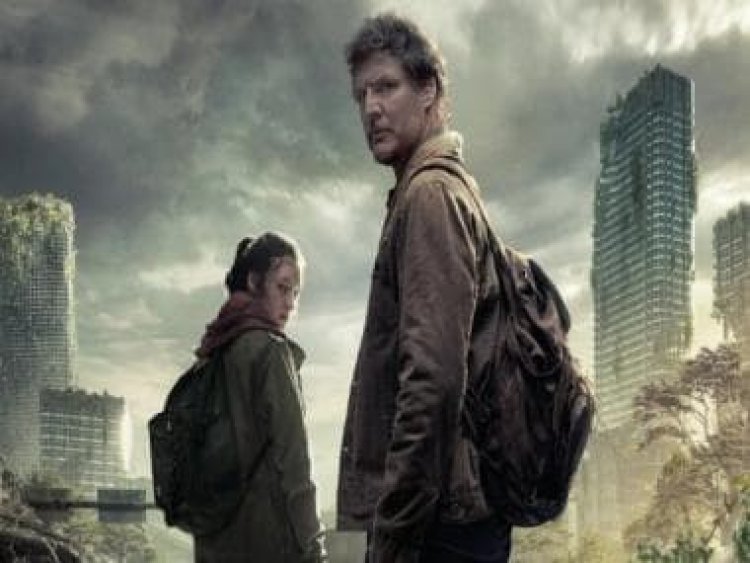The Last of Us looks like a certified winner
The Last of Us looks like a certified winner

In a scene from the first episode of HBO’s The Last of Us, a single-take shot captures the commotion of a dimly lit street, from the inside of a car. We see people tripping over each other, attacking limbs and legs, while all sense of geometry is toppled by the uncertainty of the next turn. The fact that we see this from the viewpoint of the protagonists, desperately trying to drive away, rolls that chaos into an intimately felt thud to the chest. There simply is no escape, unlike the vivid and wide hovering views of cinema’s yore. The Last of Us, stays true to the methods of the game it has been adapted from, by refusing to give into the scale, or the easy-to-render visual grammar of post-apocalyptic films that thrive on their lack of distinctiveness.
The Last of Us stars the excellent Pedro Pascal as Joel, a morally corrupt fixer of things in a post-infection America. Joel has experienced loss first-hand and he must, to an extent, confront that loss as he helps young Ellie (Bella Ramsey) across the American landscape. There is possibly no dearth of material around zombie invasions. From Zack Snyder’s trippy Dawn of the Dead, to Danny Boyle’s imperiously minimalist 28 Days Later through spoof comedies like Zombieland or satire with Shawn of The Dead, the undead have possibly held a canon of their own. Films and shows about post-apocalyptic worlds drop by the dozen every year, and for that matter, one of the longest-running shows on TV at the moment, is of course The Walking Dead.
Created by Neil Druckmann and Craig Mazin, The Last Of Us, imports nuance to a tired laboratory full of familiar tools. For one, it’s not about zombies here but a deadly virus that can infect anyone. It’s more of a Contagion meets Army of the Dead kind of situation. That means there is little room to diametrically stretch the awe of the beginning. Little time is spent establishing how things actually started and in doing so the show treats the emotional heft of a story with the urgency of the video game it has been adapted from – you’re running before you’re figuring out why. Players of the game would recall how it was eulogised for breaking barriers of storytelling on gaming units, because it was in fact written like long-form television. That energy, and creative bandwidth seamlessly coalesces with the narrow-gauge focus of the show. The piercing intimacy of a gun’s viewfinder refuses to give way to the possibilities of a world that could so easily yield to the thirst for scale, and arbitrary devices like needless CGI and VFX etc. To which point, the series further grounds the narrative in modesty.
Secondly, and this might be the part that makes The Last of Us successful, is its focus on the individuals at hand, rather than the environment, its decadent possibilities. In a scene from the first episode, for example, Joel sifts through a crowd of onlookers observing people being hung from the gallows. There crimes, though seemingly banal, are read out with haste and disinterest. No sigh or pulmonary sign of protest is accommodated. This isn’t, about the larger ethical battles, the show is subtly trying to tell us. But instead this is about Joel, the small-time smuggler who, unaffected and unmoved, finds his way through the crowd to make a petty exchange of drugs and cigarettes. The banality with which violence is portrayed echoes of the game, once considered both provocative and mature.
Most adaptations or stories around games, usually suffer from the excesses of studio execs wanting to impress their dominion over source material. The Resident Evil series is possibly a good example of a game adaptation so far detached from the emotional maturity of the material, it has over the course of time, probably brought the original bad press, if nothing else. The likes of Tomb Raider and the horrifyingly tacky Mortal Kombat, are imitations that have possibly done more harm than good. Prince of Persia, a colossal failure that almost ended Jake Gyllenhaal’s career, is a good example of film adaptations overdoing the exoticism of source material that performs better within controlled environment that gave it birth in the first palace. The Last of Us seems to have learned that lesson.
Judging by the first feature-length episode, you’d know what to expect from the rest of this series. It’s unlikely that the showrunners or the creative team have taken stark liberties with source material so rich and vivid, all that was probably needed was a restrained, dignified embrace. The point of any story is to make people care for it, embed the stakes of a story within the viewer’s brain to the point where they worrying about the specifics of the ambience, but instead want to cut deep into the peculiarities of the people they see. It’s where The Last of Us, already feels more game-like than any other stories of its ilk. And it has winner written all over it.
The Last of Us is Streaming on Hotstar
Manik Sharma writes on art and culture, cinema, books, and everything in between.
Read all the Latest News, Trending News, Cricket News, Bollywood News, India News and Entertainment News here. Follow us on Facebook, Twitter and Instagram.
What's Your Reaction?



























































